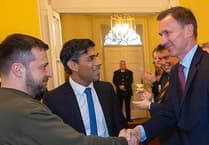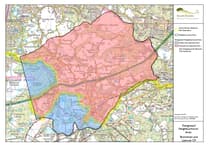SURREY residents are being told those who can afford it will need to pay to meet the county council’s 2050 net zero target.
And even with a commitment from all residents the council believes it is only possible to achieve half of what is actually needed.
If the county is to be decarbonised by 2050 then within four years greenhouse gas emissions will need to come down by at least 20 per cent from what they were in 2018, a reduction of 1.3 tonnes.
A delivery plan out this week says the public sector can make a relatively small difference but the single biggest factor needs to be taking 376,000 petrol and diesel cars off Surrey’s roads, followed by putting low carbon heating into 53,000 homes.
Ground source heat pumps cost around £10,000 and the government grant available for this is for households earning less than £30,000.
Councillor Marisa Heath, Surrey County Council’s cabinet member for environment, said: “And so here is where we need those who can afford it to make the changes themselves.
“For those on low incomes we’ve got to provide the mechanisms and financial support to make it easier, but also the information to make changes.
“Every single one of us is capable of contributing to this work through the smallest decisions over dietary changes, not using plastics, choosing to walk, using public transport, reducing waste.
“I’m not dismissing the huge investment that we’ve got to stimulate to drive change, but I am saying the small things do make a difference as well.”
Cabinet on Tuesday (October 26) unveiled its plan of how it intends to deliver the targets in its climate change strategy of May 2020.
It said that actually it believes a 40 per cent reduction in carbon emissions is necessary, rather than 20 per cent, but this is “likely to be impossible unless fundamental changes in national policy and funding levels occur”.
Councillor Jonathan Essex, leader of the Green Party group, thought this was defeatist and said the council’s delivery plan was still not ambitious enough to meet the targets in its its strategy, although he welcomed a “shift in leadership” on the issue.
“This agenda has significantly moved forward in the last few years from not really being on the table to being a major player,” he said, adding: “Yes we’ve seen it shift up the horizon in terms of our priorities, but it seems still to be viewed as secondary to economic growth.
“And it seems to me it’s that that blocks delivery that’s in line with our climate targets as considered to be impossible.
“We need to move from pilots and airports to boldly grow a well-being economy here in Surrey and do it quickly.”
Cllr Heath replied: “We will be clear between the gaps of the strategy and the delivery plan. My ambition is that they meet absolutely, but we’ve still a lot of work to do there, and I’m not going to shy away from that work.
“What we are doing is making climate change business, business as usual and recognising it as a prioritised and permanent element of running this authority.”
Matt Furniss, cabinet member for highways and councillor for Shalford, said: “Whining it’s not enough, we need more, we need it faster is not helpful.
“We need to get away from roads and housing growth equals bad; we’re not going to stop living as a society, we’re not going to stop growing, but we can do it sustainably.”
He said behavioural change was key. “People are complaining about the air quality on the road and yet at the same time oppose a new cycling and walking path because they do not believe it fits in with the character of the area.”
The county council set a target in October 2019 to plant 1.2 million trees by 2030, in other words 100,000 every year.
But two years on it has planted only around 28,500. And nearly 3,900 trees have died or been felled due to disease on county council land since the start of 2020.
The council is also hiring privately operated coaches made in the 1990s to take children to school.
Cllr Furniss said the council had set aside £32.3 million to take the worst polluting buses off Surrey’s roads, replacing those in the east with hydrogen buses and those in the west, where routes are shorter, with electric.
However some of the diesel vehicles still used for home to school transport are around 25 years old and emit far higher levels of carbon monoxide, high hydrocarbon and nitrogen oxides than modern coaches.
Outside the meeting council leader Tim Oliver said: “It’s a mixture of public and private investment in replacing the existing bus fleet.
“We will be using some of our on-demand minibus services for school transport as well going forward so that will take out the need for some of those buses.”
Councillor Andy MacLeod (Res Asstn, Farnham Central) told Cabinet the council needed to press the Government to allow remote meetings “so we don’t have to waste money and time and cause increased pollution travelling to Woodhatch”.
Cllr Oliver said he had met with communities secretary Michael Gove last week who was supportive of hybrid meetings, but it would require a change in the law.




